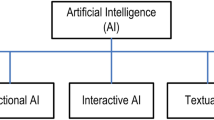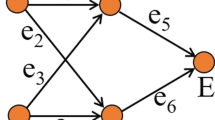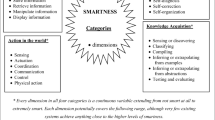Abstract
A smart home is considered as a polystructure system with information and energy interactions between its components. The polystructure components of a smart home are analyzed. Energy-information processes, such as energy consumption, controllability, reliability, and cost efficiency, which allow complex effective management of the polystructure, were analyzed and promising methods for assessing its functioning are presented.


Similar content being viewed by others
REFERENCES
Tsifrovoi perekhod v elektroenergetike Rossii: Tsentr strategicheskikh razrabotok, ekspertno-analiticheskii doklad (Digital Transition in the Electric Power Industry of Russia: Center for Strategic Research, Expert and Analytical Report), Moscow: Tsentr strategicheskikh razrab., 2017. https://csr.ru/wp-content/uploads/2017/09/ Doklad_energetika-Web.pdf. Accessed September 1, 2019.
Mozokhin, A.E., Drozdov, V.G., and Staroverov, B.A., Energetika novogo uklada (EnergyNet): Proektirovanie intellektual’nykh tsifrovykh sistem na elektricheskikh podstantsiyakh: Ucheb. posobie (Energy Industry of the New Order (EnergyNet): Design of Intelligent Digital Systems in Electrical Substations: Handbook), Kostroma, 2018.
Petrova, S.Yu., The general task of managing a multistructure system, Vestn. Novgorod. Gos. Univ., 2009, no. 50, pp. 35–39.
Shchekochikhin, O.V., Shvedenko, V.V., and Shvedenko, P.V., Ontology of concepts of an information system with behavior, Nauchno-Tekh. Vestn. Povolzh’ya, 2016, no. 5, pp. 223–226.
Perov, V.I. and Parakhina, V.N., Formirovanie polistrukturnykh sotsial’no-ekonomicheskikh sistem i osobennosti upravleniya imi (The Formation of Polystructure Socio-Economic Systems and Their Management Features), Moscow: Izd. “NEFT’ i GAZ” Ross. Gos. Univ. Nefti i Gaza im. I. M. Gubkina, 2007.
Shvedenko, V.N., Shchekochikhin, O.V., and Rovinskaya, T.I., Data mining in an integrated information system with the property of behavior, Inf. Svyaz, 2018, no. 2, pp. 30–34.
Rau, N.S. and Tayor, B., A central inventory of storage and other technologies to defer distribution upgrades-optimization and economics, IEEE Trans. Power Delivery, 1998, vol. 13, no. 1, pp. 194–202. https://doi.org/10.1109/61.660878
Subudhi, S., Agarwal, P., and Ghose, T., A multistage concept for distribution system planning, Proceedings of First International Conference on Automation, Control, Energy and Systems, Hooghy, 2014, pp. 1–6. https://doi.org/10.1109/ACES.2014.6808024
Masera, M., Bompard, E.F., Profumo, F., and Hadjsaid, N., Smart (electricity) grids for smart cities: Assessing roles and societal impacts, Proc. IEEE, 2018, vol. 106, no. 4, pp. 613–625. https://doi.org/10.1109/JPROC.2018.2812212
Cheng, Z., Duan, J., and Chow, M.-Y., To centralize or to distribute: That is the question: A comparison of advanced microgrid management systems, Ind. Electron. Mag. IEEE, 2018, vol. 12, no. 1, pp. 6–24.https://doi.org/10.1109/MIE.2018.2789926
Du, Y., Hao, T., Lukic, S., Lubkeman, D., Dubey, A., and Karsai, G., Development of a controller hardwarein-the-loop platform for microgrid distributed control applications, Electronic Power Grid (eGrid) 2018 IEEE, 2018, pp. 1–6. https://doi.org/10.1109/eGRID.2018.8598696
Zhao, C., Chen, J., He, J., and Cheng, P., Privacy-preserving consensus-based energy management in smart grids, Signal Process. IEEE Trans., 2018, vol. 66, no. 23, pp. 6162–6176. https://doi.org/10.1109/TSP.2018.2872817
Wang, K., Hu, X., Li, H., et al., A survey on energy internet communications for sustainability, IEEE Trans. Sustainable Comput., 2017, vol. 2, no. 3, pp. 231–254. https://doi.org/10.1109/TSUSC.2017.2707122
Alahakoon, D. and Yu, X., Smart electricity meter data intelligence for future energy systems: A survey, IEEE Trans. Ind. Inf., 2016, vol. 12, no. 1, pp. 425–436.
Philip, B.V., Alpcan, T., Jin, J., and Palaniswami, M., Distributed real-time IoT for autonomous vehicles, Ind. Inf. IEEE Trans., 2019, vol. 15, no. 2, pp. 1131–1140. https://doi.org/10.1109/TII.2018.2877217
Islam, T. and Hashem, M.M.A., A big data management system for providing real time services using fog infrastructure, Proceedings of the IEEE Symposium on Computer Applications & Industrial Electronics, Penang, 2018, pp. 85–89. https://doi.org/10.1109/ISCAIE.2018.8405449
Author information
Authors and Affiliations
Corresponding authors
Ethics declarations
The authors declare that they have no conflict of interest.
Additional information
Translated by K. Lazarev
About this article
Cite this article
Shvedenko, V.N., Mozokhin, A.E. Methodological Foundations for the Formation of Information Space and Digital Twin Objects in Smart Homes. Autom. Doc. Math. Linguist. 53, 303–308 (2019). https://doi.org/10.3103/S0005105519060074
Received:
Published:
Issue Date:
DOI: https://doi.org/10.3103/S0005105519060074




